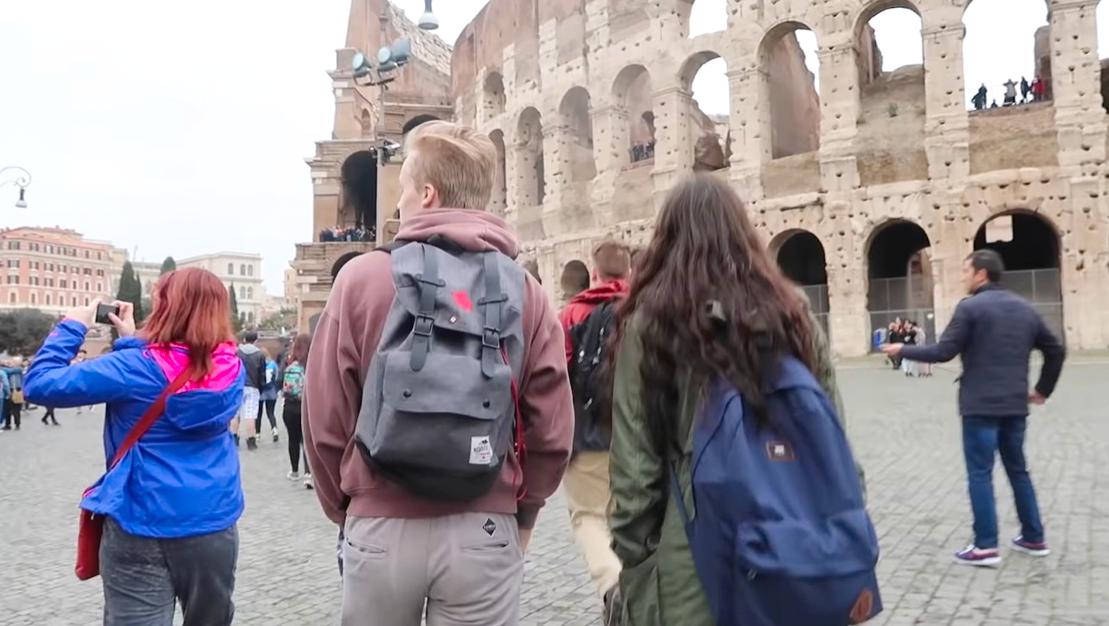While all educational tours can be beneficial to students, what is the difference between an educational tour to your local museum, and an educational tour abroad? It’s simple: There are tons of advantages to educational tours abroad, making your students better people for the rest of their lives.
So how exactly does an international school trip help high school students? The differences in experience and value between an educational tour to a museum or research center an hour from the school and an educational tour that takes your students to the other side of the world are immense.
Students grow up – learning independence, becoming aware of their role in their greater society; they learn to see the world through a different culture while simultaneously appreciating and understanding their own culture and identity; they learn empathy, they understand their potential, and of course, they learn the value of lifelong learning.
Let’s go into these one by one.
1) You Grow Up in Ways You Just Can’t Back at Home
Let’s start with the most important thing you should be hoping your child will experience: growing up. We can grow up in a few different ways – we grow up as individuals who can stand on our own two feet; we grow up as people who learn that time is a finite resource; we grow up as students who use what they learn actively instead of just letting their learning go to waste in their heads.
Going abroad forces students to grow up in ways that you just don’t experience with local field trips. There are a few reasons for this.
- You are alone and learn how to be alone: Technically, you should never really be alone on your overseas school trip. But this might be the first time you have been so far away from your family. It is up to you to make sure you survive and have all the things you need – your passport, your documents, your baggage. You find yourself absolutely responsible for yourself, and for many students, their first international student travel trip without their family is the first time they taste the feeling of utter independence.
- You see yourself as a part of the world, not a classroom: As a student, it can be easy to grow up thinking of rules as just things that your teachers and parents tell you to do. You behave because you have to, and the moment the teacher walks out of the classroom, you can do whatever you want. But something happens in a student’s head when they find themselves in a foreign country with less than a handful of chaperones to enforce the rules: the real world doesn’t have the same rules. You can be rowdy, loud, obnoxious – but now you realize that you don’t want to be on this adventure.
- You bond socially with your peers for more than just homework or activities: You fall into routines in school, and for everyone outside of your social circle of shared interests and community, you might just see them as other people on campus. An international trip pushes students into the unfamiliar, and only in the unfamiliar can you see every student as part of your group. You bond with people you might have only ever exchanged a few words with, and find yourself making friends with people even if you have zero obvious common interests. You learn the importance of making friends actively, instead of simply passively falling into social circles that make sense.
2) You Understand Your Culture and Heritage by Immersing Yourself in Another
In the United States, we wonder a lot if we have our own culture. Some like to call us a post-modern melting pot with no single unifying culture; others like to claim that we have no culture at all.
And the problem with believing that we have no culture of our own is that it makes it more difficult to identify ourselves with a national heritage; and without a national heritage, it makes it more difficult to understand who we are as people.
But ask any visitor who has explored the United States, and they would tell you that we do have a very distinct culture. However, too often we fail to recognize or acknowledge our culture, mostly because we don’t have much to compare it with. With an educational tour abroad, you can give your students their first taste of another culture, and all the learning that comes with it.
By immersing a student in a foreign culture, they see the world in a different way for the first time in their lives. The different language, cuisine, traditions, art, and even common temperament in another place – all of these combine to create a cultural punch in the gut, so much so that many students can feel absolutely culture shocked by a single trip to a contrasting culture.
And this is a good thing. It is crucial in a student’s understanding of the greater world to see that our personal realities and ways of thinking can be shaped by the culture we grow up in. We also make students further realize the aspects of their own American culture that they can hold onto as a part of who they are, instead of taking their own identity for granted.
 3) You Realize That Life and Learning Are Not Mutually Exclusive
3) You Realize That Life and Learning Are Not Mutually Exclusive
As a student, your life consists of blocks, classes, and assignments, all rigorously tethered to a schedule that sets a purpose for every minute you find yourself in school (and even after!).
While this form of education is effective at getting the most out of every school day – maximizing the amount of educational content a student is fed everyday – it also unfortunately gives students the impression that there is a distinct wall between the regular life they know and love, and the strict learning of their school.
And this is problematic. There is endless research supporting the idea that classroom learning, while pragmatic and simple, is not enough on its own to properly educate a student. Experiential learning, engaged learning, and personalized learning are just a few alternative education strategies proposed in recent years, strategies that focus more on building the student’s willingness to learn, rather than tackling the issue of learning itself.
Simply put, a student needs to learn that learning and life aren’t two separate things, and one of the best ways to teach that is through student travel. Student tours abroad combine a few distinct learning elements: absolute immersion into an entirely new world and culture, a path that concentrates on learning throughout the student travel trip and adventure, and the student’s personal excitement with their friends and peers.
These three aspects combined are perfect for teaching a student that learning can be fun, learning can be engaging, and learning can be something they do not just do in the classroom when a teacher is watching, but all the time. If you can teach a student to fall in love with learning, you can set them on a positive path for life.
4) You Set Yourself Up for the Future
The benefits of an early travel educational experience are unrivaled by any other activity a school can offer their students. Studies have found that students with travel experience abroad grow up to become more innovative, more creative, more outgoing, and more compassionate.
In one study by a global market research firm, it was discovered that adults who had experienced educational travel as teenage students earned an average salary 12% higher than their peers in similar positions.
But why is this, exactly? There are a few possible reasons to explain the added benefit and future success of early educational travel.
- You become less afraid of your potential: If you have never left your small town or city, it can be easy to fall into the belief that your home is the whole world. You know this isn’t true, but you simply don’t imagine yourself doing anything else or being anywhere else. If you experience travel, you open yourself up to a treasure chest of possibilities: different places to study, to apply for scholarships, to work, and to live.
- You realize the unfamiliar isn’t bad: Too often we are taught that discomfort and unfamiliarity are things we should shun away, but this isn’t always the case. In our efforts to protect students from the dangers of the world, we inadvertently teach them to reject possible doors down better paths. Students who experience the discomfort and unfamiliarity of being in a different place are more willing to try new things and be better, bigger people.
- You want more for yourself: And of course, when you get a taste of the world, you never want to stop tasting it. Students who experience student tours abroad learn to want more for themselves – they want to see more, learn more, and experience more, and they learn that only through hard work and focus can they become the people they want to be for themselves, and they reap the benefits of these desires.
5) You Care More About the World
And finally, perhaps the most important point: you wake up. For some students, you start to care. Getting out of your personal bubble by immersing yourself in a foreign land can wake students up from their daily routines and schedules, and teach them to find interest in whatever they want.
Students who travel have been found to have higher levels of empathy and understanding for other people, and they also get the opportunity to develop personal networks around the world.
In many ways, educational travel overseas is like opening Pandora’s box: as soon as a student tries it for the first time, the benefits and learning they experience will never be forgotten.
Take Your High School Students on an International Educational Trip with the Pros
At Junior Tours, we have planned and organized countless field trips over the last several decades, both within and outside of the United States. We prioritize student engagement and learning, ensuring that every trip is absolutely fit for the interests, desires, and size of your group of students. As a family-run American company, we understand the value of personalizing every trip so you get the most out of your Junior Tours experience.
Interested in learning more about our educational tours, or just need some student travel tips? Contact us today or fill in our online request form, and we will get back to you as soon as possible.


